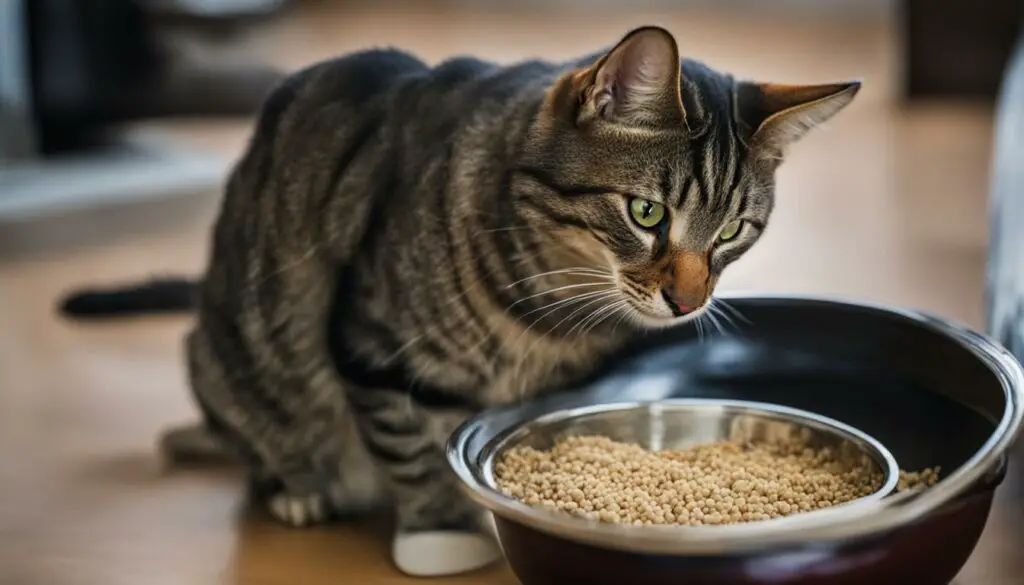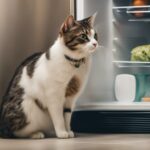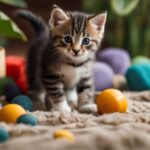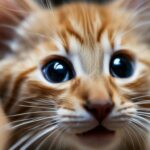Do you ever find yourself wondering why your beloved feline friend is always hungry and meowing? It’s important to remember that this behavior could indicate a medical issue that needs attention. As a responsible pet owner, recognizing hunger cues in your cat and knowing when to consult a veterinarian is essential to ensure their overall well-being.
Key Takeaways:
- Constant hunger and meowing in cats can be a sign of an underlying medical condition, and it’s crucial to seek veterinary attention.
- Hungry cats may exhibit behaviors like meowing, begging, and staring at their owners to communicate their need for food.
- Causes of constant hunger in cats can range from boredom and low-quality diet to more serious conditions like hyperthyroidism and diabetes.
- Environmental enrichment, proper nutrition, and addressing psychological factors can help manage a cat’s excessive hunger.
- If your cat consistently displays excessive hunger, it’s important to consult a veterinarian for a proper diagnosis and treatment plan.
Typical Behavior of Hungry Cats
Cats are known for their independent and sometimes mysterious nature. When it comes to hunger, they have their unique ways of letting us know. If you have a cat that is always meowing and appears to be constantly hungry, it’s essential to understand their typical behavior in these situations.
One common behavior of hungry cats is meowing. They may meow persistently, especially during feeding times or when they see their owners near the kitchen. This vocalization is their way of communicating their needs and expressing their desire for food. Additionally, hungry cats may exhibit demanding behavior, such as pawing at their food bowls, staring at their owners, or even attempting to steal food from counters.
Understanding these hunger-related behaviors can help you address your cat’s needs appropriately. By recognizing their cues, you can ensure they receive the necessary nutrition without overfeeding or encouraging unhealthy begging behaviors. Providing a consistent mealtime routine and engaging in interactive play sessions can help establish a healthy feeding pattern and reduce excessive meowing for food.
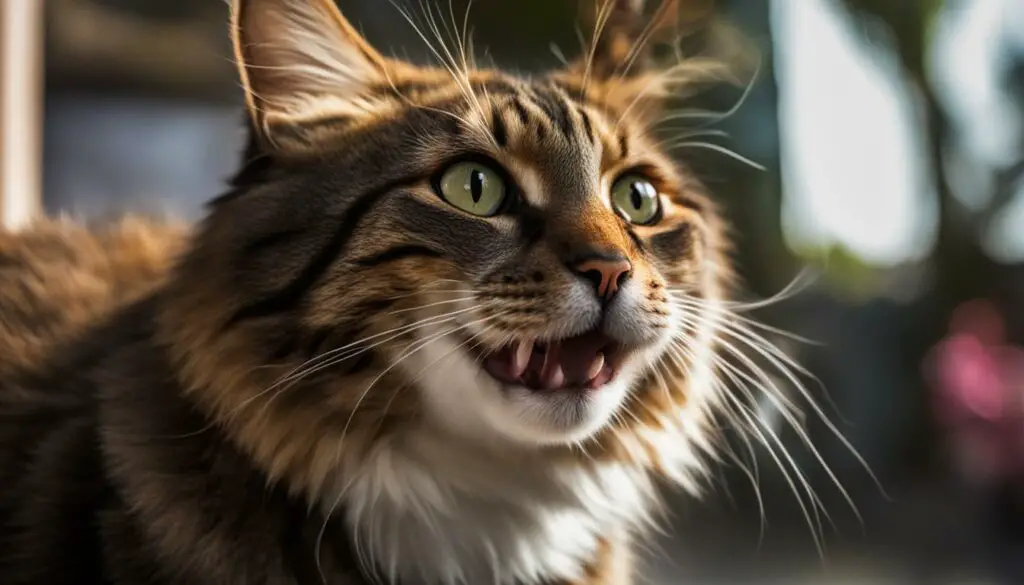
Reasons Behind Constant Hunger
A cat that is always hungry and constantly meowing may have various underlying causes. It is important to identify the specific reason for constant hunger in order to provide the appropriate diagnosis and treatment. Here are some potential reasons why your cat may be exhibiting this behavior:
- Boredom: Cats that are bored may seek out food as a form of entertainment. Providing environmental enrichment, such as puzzle toys and interactive playtime, can help alleviate their constant hunger.
- Low-quality diet: A diet that lacks proper nutrition may leave a cat feeling unsatisfied and constantly seeking food. Switching to a high-quality, feline-formulated diet can help address their hunger and nutritional needs.
- Aging and changes in metabolism: As cats age, their metabolism may slow down, leading to increased appetite. Adjusting their diet and monitoring their weight can help manage their hunger.
- Side effects of medications: Certain medications can stimulate a cat’s appetite, causing them to constantly feel hungry. Discussing any medication side effects with your veterinarian is important in managing their hunger.
- Intestinal parasites: Parasites like roundworms and tapeworms can steal nutrients from cats, leading to increased hunger despite regular feedings. A fecal test and proper deworming can help eliminate these parasites.
- Hyperthyroidism: An overactive thyroid gland can cause cats to have an insatiable appetite. Blood tests can diagnose this condition, and treatment options may include medication or radioactive iodine therapy.
- Diabetes: Cats with diabetes may experience increased hunger due to imbalanced blood sugar levels. Regular blood glucose testing, insulin therapy, and dietary changes are necessary to manage their appetite.
- Malabsorptive diseases: Conditions like inflammatory bowel disease and exocrine pancreatic insufficiency can interfere with nutrient absorption, leading to increased hunger. Veterinary examination and appropriate diagnostic testing are crucial to guide treatment options.
Identifying the specific reason behind your cat’s constant hunger is essential for developing an effective management plan. Consulting with a veterinarian will help determine the appropriate course of action to address their dietary needs and overall well-being.
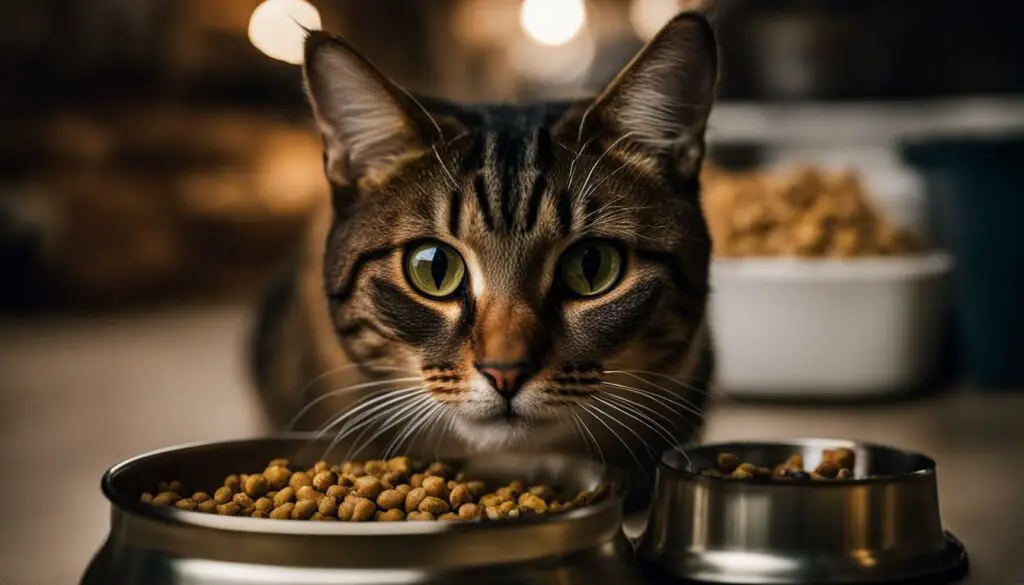
| Potential Reasons for Constant Hunger in Cats | Management Strategies |
|---|---|
| Boredom | – Provide environmental enrichment – Use puzzle toys and interactive playtime |
| Low-quality diet | – Switch to high-quality, feline-formulated diet |
| Aging and changes in metabolism | – Adjust diet and monitor weight |
| Side effects of medications | – Discuss medication side effects with veterinarian |
| Intestinal parasites | – Fecal test and proper deworming |
| Hyperthyroidism | – Blood tests for diagnosis – Medication or radioactive iodine therapy |
| Diabetes | – Regular blood glucose testing – Insulin therapy and dietary changes |
| Malabsorptive diseases | – Veterinary examination and diagnostic testing |
Managing a cat’s constant hunger may require a combination of strategies, including dietary changes, environmental enrichment, and medical interventions. Working closely with a veterinarian will ensure the best possible outcome for your cat’s health and well-being.
Behavioral Factors Contributing to Excessive Hunger
When your cat constantly meows for food and you’re wondering how to stop a cat from meowing, it’s important to consider the behavioral factors that may contribute to their excessive hunger. Boredom and behavioral issues can play a significant role in driving your cat’s constant desire for food. To address this, providing environmental enrichment and interactive toys can alleviate boredom and reduce their meowing for food.
Cats are intelligent creatures that need mental stimulation to keep them engaged and satisfied. Without appropriate mental stimulation, they may resort to excessive meowing as a means of seeking attention or something to do. Interactive toys, such as puzzle feeders or treat balls, can help engage their natural hunting instincts and provide mental stimulation while slowing down their eating process.
Additionally, establishing a consistent feeding routine can help manage your cat’s hunger. Cats thrive on routine and may become anxious or demanding when their mealtime routine is disrupted. By feeding them at the same times each day, you can help reduce their meowing for food outside of their designated feeding times.
Addressing Separation Anxiety
In some cases, excessive meowing for food may be a result of separation anxiety. Cats that experience anxiety when left alone may exhibit hunger-related behaviors as a way to seek comfort and security. If your cat displays signs of separation anxiety, such as destructive behavior or excessive vocalization when you’re away, it’s important to address their anxiety through behavior modification techniques or, in severe cases, consultation with a veterinary behaviorist.
| Signs of Separation Anxiety in Cats | Strategies to Address Separation Anxiety |
|---|---|
| Clinginess and following the owner around | Gradual desensitization to being alone |
| Inappropriate elimination when alone | Creating a safe and comfortable space |
| Destructive behavior when left alone | Providing environmental enrichment and interactive toys |
| Excessive meowing or vocalization when left alone | Behavior modification techniques |
By addressing the behavioral factors contributing to your cat’s excessive hunger, you can help reduce their meowing for food and promote a more balanced and contented lifestyle. However, if your cat’s excessive hunger persists despite environmental enrichment and behavioral interventions, it is important to consult with a veterinarian to rule out any underlying medical conditions that may be contributing to their constant hunger.
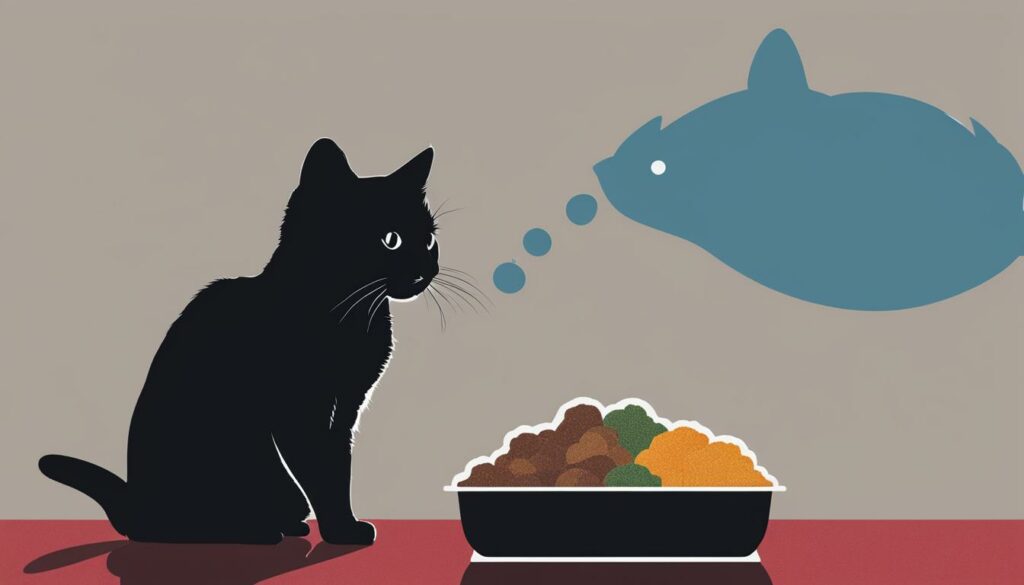
Nutritional Factors and Hungry Cats
Feeding a well-balanced, feline-formulated diet is essential in addressing the issue of cats constantly meowing for food and appearing hungry. Providing a diet based on the cat’s age, activity level, and nutritional needs can help prevent excessive hunger and promote overall health.
Consulting with a veterinarian is crucial in determining the appropriate diet and caloric intake for your cat. They can assess your cat’s specific needs and recommend a suitable food that meets their nutritional requirements. Additionally, the veterinarian can provide guidance on portion sizes and feeding schedules to ensure your cat receives adequate nutrition without experiencing constant hunger.
It is important to note that table scraps and human food should be avoided as they can create imbalances in a cat’s diet and contribute to excessive hunger. Stick to high-quality commercial cat food that is specifically formulated to meet their unique dietary needs.
In case your cat has specific dietary restrictions or health conditions that require a specialized diet, the veterinarian may recommend prescription diets that address those specific needs. These diets are designed to manage various conditions such as allergies, kidney disease, or weight management, while still providing the necessary nutrients.
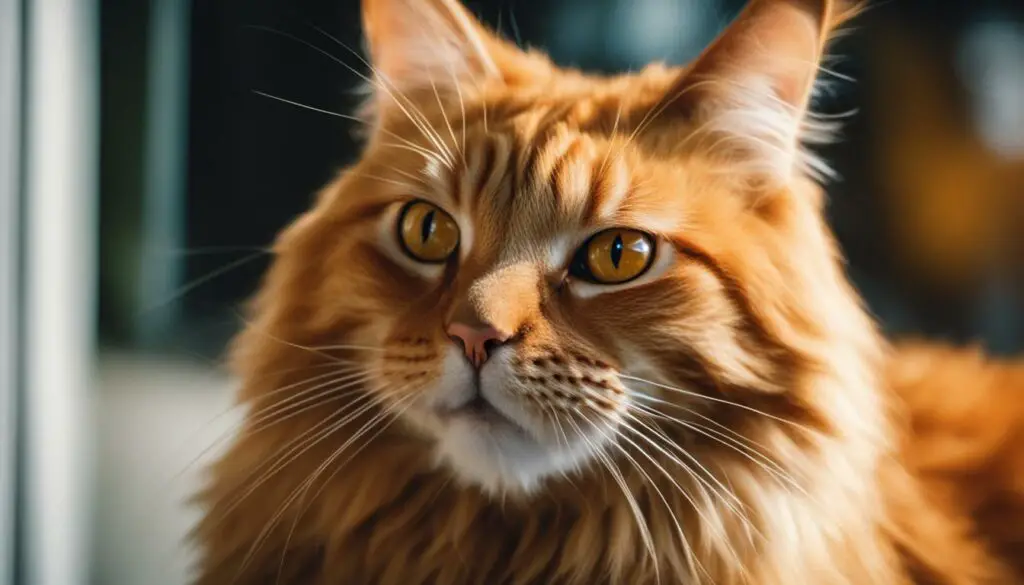
Nutrition Tips to Address Excessive Hunger:
- Choose a high-quality, feline-formulated diet that satisfies your cat’s nutritional requirements.
- Follow the recommended feeding portion sizes to avoid overfeeding or underfeeding.
- Establish a consistent feeding schedule to help regulate your cat’s hunger cues.
- Minimize or eliminate table scraps and human food from their diet.
- Consult with a veterinarian for dietary advice if your cat has specific health conditions or dietary restrictions.
By ensuring your cat receives a balanced and appropriate diet, you can help manage their hunger and promote their overall well-being.
| Food Type | Benefits |
|---|---|
| Dry Cat Food | Convenient and promotes dental health |
| Wet Cat Food | High moisture content and palatability |
| Raw or Homemade Diets | Allows customization but requires careful formulation |
| Prescription Diets | Manage specific health conditions |
Remember, proper nutrition plays a significant role in addressing excessive hunger in cats. Consult your veterinarian for personalized dietary recommendations to ensure your cat’s nutritional needs are met and their constant meowing for food is properly managed.
Medical Conditions and Constant Hunger
When your cat is constantly hungry and meowing for food, it could be a sign of an underlying medical condition. Cats, like humans, can experience various health issues that affect their appetite. Identifying the specific cause for your cat’s constant hunger is crucial in order to provide the appropriate treatment. Let’s explore some common medical conditions that can contribute to this behavior.
Hyperthyroidism
One possible cause of constant hunger in cats is hyperthyroidism. This condition occurs when the thyroid gland produces an excess amount of thyroid hormone, leading to an increased metabolic rate. As a result, cats with hyperthyroidism can have an insatiable appetite. Diagnostic tests such as blood work and imaging techniques can confirm this condition, and treatment options may include medication or radioactive iodine therapy.
Diabetes
Another medical condition that can cause your cat to be constantly hungry is diabetes. Diabetes in cats is characterized by imbalanced blood sugar levels, which can lead to increased hunger. If your cat is exhibiting symptoms of diabetes such as increased thirst, frequent urination, and weight loss, it’s important to consult with a veterinarian. Diagnosis typically involves blood glucose testing and urine analysis. Treatment may include insulin therapy, dietary changes, and regular monitoring of blood sugar levels.
Malabsorptive Diseases
Malabsorptive diseases, such as inflammatory bowel disease and exocrine pancreatic insufficiency, can disrupt nutrient absorption in cats. This can result in weight loss, muscle wasting, and increased appetite. Diagnosis of these conditions often involves bloodwork, urine testing, and imaging techniques to evaluate the gastrointestinal system. Treatment options may include dietary modifications, enzyme replacement therapy, and medications to reduce inflammation.
| Medical Condition | Symptoms | Treatment |
|---|---|---|
| Hyperthyroidism | Insatiable appetite, weight loss, increased thirst | Medication, radioactive iodine therapy |
| Diabetes | Increased hunger, frequent urination, weight loss | Insulin therapy, dietary changes |
| Malabsorptive Diseases | Increased appetite, weight loss, muscle wasting | Dietary modifications, enzyme replacement therapy, medications |
If you suspect that your cat’s constant hunger is due to a medical condition, it is important to consult with a veterinarian as soon as possible. They can perform the necessary diagnostic tests to determine the underlying cause and develop an appropriate treatment plan. By addressing these medical conditions, you can help alleviate your cat’s constant hunger and improve their overall well-being.
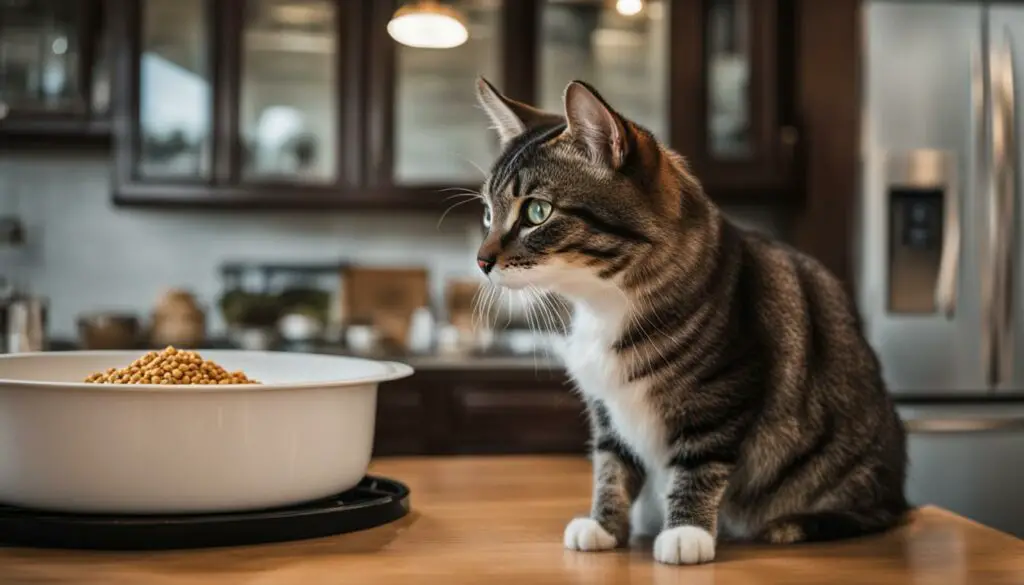
Effects of Intestinal Parasites on Hunger
Intestinal parasites can have a significant impact on a cat’s appetite, leading to constant hunger and excessive meowing for food. Parasites such as roundworms and tapeworms can steal essential nutrients from the cat’s digestive system, causing malnutrition despite frequent feedings. It is crucial to understand the effects of these parasites and take appropriate measures to eliminate them.
A thorough examination of the cat’s feces through fecal testing can help identify the presence of intestinal parasites. Once diagnosed, deworming medications prescribed by a veterinarian can effectively eliminate these parasites. By getting rid of the parasites, the cat’s nutritional absorption improves, and their excessive hunger gradually decreases.
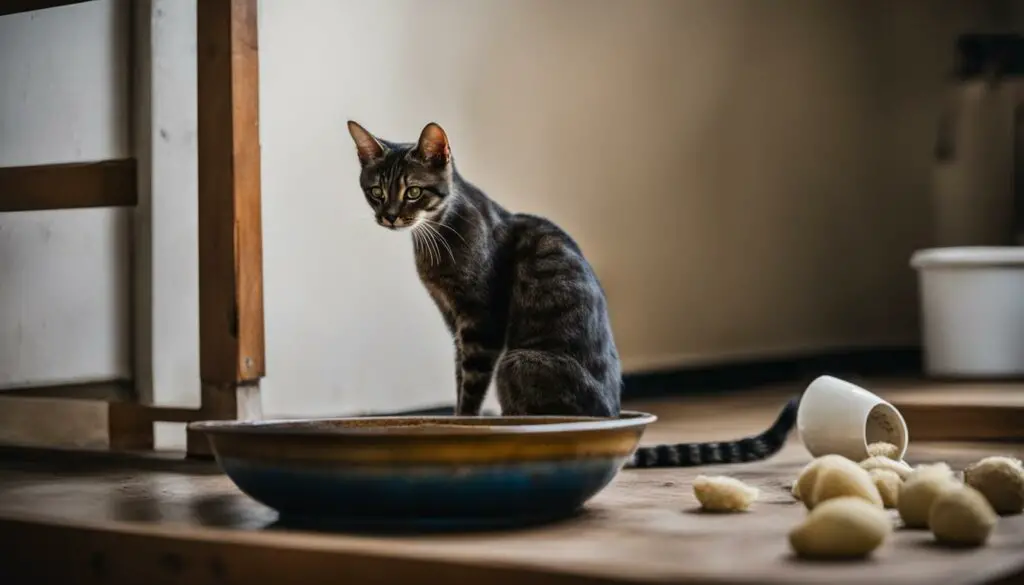
| Effects of Intestinal Parasites on Hunger | Signs and Symptoms | ||
|---|---|---|---|
| 1. Nutritional deficiencies | – Weight loss | – Poor coat condition | – Lethargy |
| 2. Increased appetite | – Constant meowing for food | – Begging behavior | – Food stealing |
| 3. Gastrointestinal disturbances | – Diarrhea | – Vomiting | – Abdominal discomfort |
It is essential to maintain a regular deworming schedule, especially for outdoor cats and those in multi-pet households. Preventative measures such as providing clean litter boxes, avoiding contact with contaminated soil or feces, and practicing good hygiene can help reduce the risk of re-infection. Regular veterinary check-ups also play a crucial role in monitoring the cat’s overall health and preventing the recurrence of intestinal parasites.
Hyperthyroidism and Insatiable Appetite
One of the potential reasons behind a cat’s constant hunger and meowing is hyperthyroidism. This condition occurs when the thyroid gland produces an excessive amount of thyroid hormone, which plays a crucial role in regulating metabolism. Hyperthyroidism can lead to an increased appetite in cats, causing them to constantly seek out food.
To diagnose hyperthyroidism, a veterinarian may perform blood tests to measure the levels of thyroid hormones in the cat’s body. If the diagnosis is confirmed, treatment options can include medication or radioactive iodine therapy, depending on the severity of the condition.
Regular monitoring is essential to ensure the effectiveness of the treatment. Adjustments to the cat’s medication may be necessary to maintain balanced hormone levels. Additionally, periodic blood tests will help assess the cat’s response to treatment and provide ongoing management of their appetite.
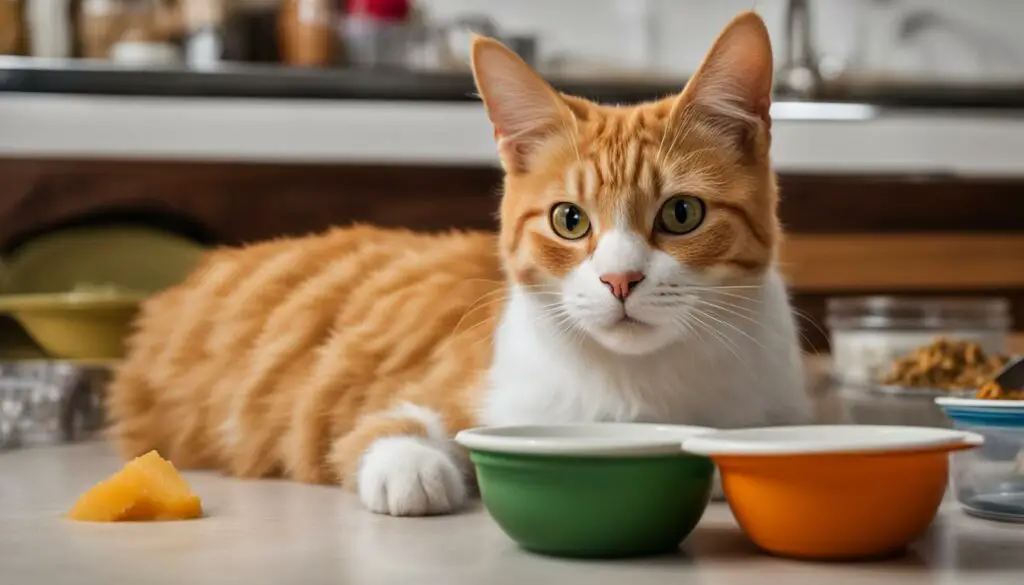
While hyperthyroidism is a common cause of insatiable appetite in cats, it is vital to consult a veterinarian for an accurate diagnosis. Other underlying conditions, such as diabetes or malabsorptive diseases, can also contribute to constant hunger in cats. A thorough veterinary evaluation will help determine the specific cause and guide appropriate treatment options for your feline companion.
Understanding Diabetes and Increased Hunger
When my cat is always hungry and crying, it could be a sign of underlying health issues, such as diabetes. Diabetes in cats is characterized by imbalanced blood sugar levels, which can cause increased appetite and excessive hunger. If you notice your cat constantly meowing for food and displaying other symptoms like increased thirst, weight loss, or frequent urination, it is crucial to consult a veterinarian for a proper diagnosis.
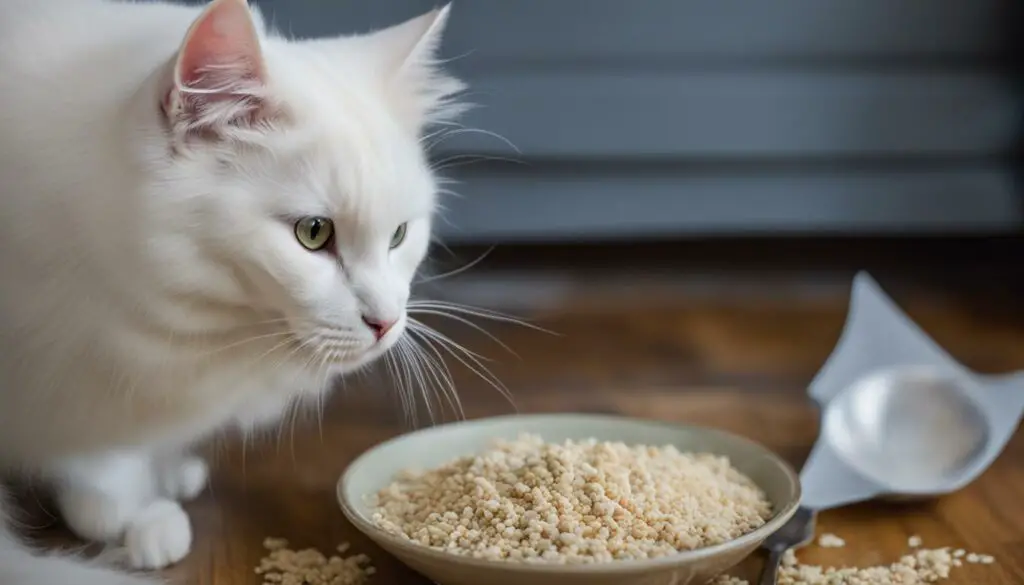
Diagnosing diabetes in cats involves blood glucose testing and urine analysis. If diabetes is confirmed, your veterinarian will develop a personalized treatment plan that may include insulin therapy and dietary changes. Managing diabetes in cats can help control their appetite, stabilize their blood sugar levels, and improve their overall quality of life.
Common symptoms of diabetes in cats:
- Increased appetite and constant hunger
- Excessive thirst
- Weight loss
- Frequent urination
- Lethargy or weakness
It’s important to note that diabetes in cats requires ongoing monitoring and management. Regular veterinary check-ups, close observation of your cat’s behavior and appetite, and consistent adherence to the prescribed treatment plan are essential for keeping your cat healthy and managing their increased hunger effectively.
Malabsorptive Diseases and Constant Hunger
Malabsorptive diseases can significantly impact a cat’s ability to absorb nutrients properly, leading to weight loss, muscle wasting, and an increased appetite. Conditions such as inflammatory bowel disease (IBD) and exocrine pancreatic insufficiency (EPI) can disrupt the digestion and absorption process, leaving cats feeling hungry despite adequate food intake.
Diagnosing malabsorptive diseases often requires a combination of bloodwork, urine testing, and imaging techniques. A veterinary examination can help identify any abnormalities in the digestive system and guide appropriate treatment options. Management of malabsorptive diseases typically involves a combination of dietary modifications, enzyme supplementation, and medication to reduce inflammation and support gastrointestinal health.
In cases of IBD, a hypoallergenic or novel protein diet may be recommended to alleviate symptoms and reduce inflammation. Additional supplements like probiotics or prebiotics can be beneficial in restoring the balance of gut bacteria and improving nutrient absorption. EPI, on the other hand, requires enzyme replacement therapy to aid in the digestion and absorption of nutrients.
It’s important to note that malabsorptive diseases can be complex and may require ongoing management and monitoring. Working closely with a veterinarian to develop a comprehensive treatment plan tailored to your cat’s specific needs is crucial in ensuring their overall well-being and managing their constant hunger.
| Malabsorptive Disease | Symptoms | Treatment Options |
|---|---|---|
| Inflammatory Bowel Disease (IBD) | Chronic diarrhea, vomiting, weight loss, increased appetite | – Hypoallergenic or novel protein diet – Probiotics or prebiotics – Medication to reduce inflammation |
| Exocrine Pancreatic Insufficiency (EPI) | Weight loss, diarrhea, increased appetite | – Enzyme replacement therapy – Nutritional supplementation |
Understanding the Impact
Malabsorptive diseases can have a profound impact on a cat’s overall health and quality of life. The inability to properly absorb nutrients can lead to deficiencies, weakened immune function, and various secondary complications. Cats experiencing constant hunger due to malabsorptive diseases may require lifelong management and close monitoring to ensure their nutritional needs are met and their symptoms are effectively controlled.
By understanding the role of malabsorptive diseases in constant hunger, cat owners can take proactive steps to address their cat’s specific needs. Regular veterinary check-ups, appropriate diagnostic tests, and a collaborative treatment approach are key to managing these conditions and providing the best possible care for cats experiencing constant hunger.
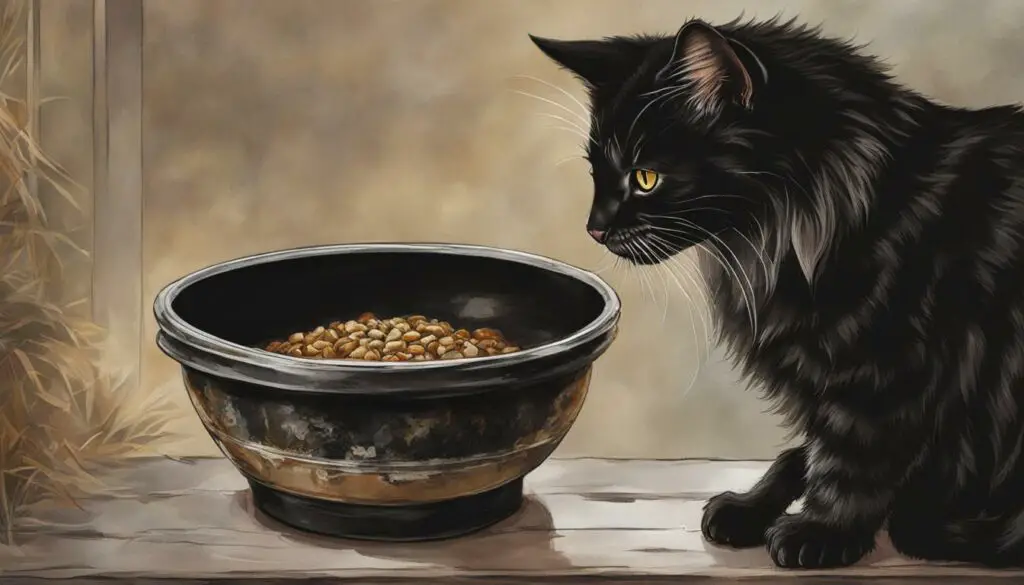
Psychological Factors and Hunger in Cats
Cats’ meowing is a form of communication, and sometimes, it can be a result of psychological factors such as boredom, anxiety, and depression. Just like humans, cats can experience emotional states that drive them to seek food for comfort or as a source of entertainment. Understanding these psychological factors can help us address their underlying needs and alleviate excessive hunger.
Boredom is a common psychological factor that can contribute to a cat’s constant meowing and hunger. Cats are intelligent and curious animals, and when they lack mental stimulation, they may resort to meowing and seeking food as a way to alleviate their boredom. Providing environmental enrichment such as interactive toys, puzzle feeders, and scratching posts can help keep your cat mentally engaged and reduce their desire for constant food.
Anxiety and depression can also play a role in a cat’s excessive hunger. Changes in their environment, the addition of new pets or family members, or even a lack of social interaction can trigger anxiety or depression in cats. These emotional states can manifest as constant meowing and a heightened desire for food. Creating a consistent routine, providing a safe and calm environment, and offering a comforting presence can help alleviate anxiety and depression in cats and reduce their excessive hunger.
Alleviating Psychological Factors in Cats
There are several strategies you can implement to address the psychological factors contributing to your cat’s hunger:
- Provide environmental enrichment: Offer toys, scratching posts, and interactive playtime to keep your cat mentally stimulated and entertained.
- Create a consistent routine: Establish a regular feeding schedule and stick to it, as cats thrive on predictability and routine.
- Offer social interaction: Spend quality time with your cat, engaging in play sessions and providing affection and attention.
- Consider pheromone therapy: Pheromone diffusers or sprays can help create a calming environment and reduce anxiety in cats.
By addressing these psychological factors and implementing appropriate strategies, you can help alleviate your cat’s excessive hunger and promote their overall well-being.
| Psychological Factors | Strategies to Address |
|---|---|
| Boredom | Provide environmental enrichment such as toys, puzzle feeders, and scratching posts. |
| Anxiety | Create a calm and safe environment, establish a routine, and consider pheromone therapy. |
| Depression | Offer social interaction, engage in play sessions, and provide comfort and attention. |
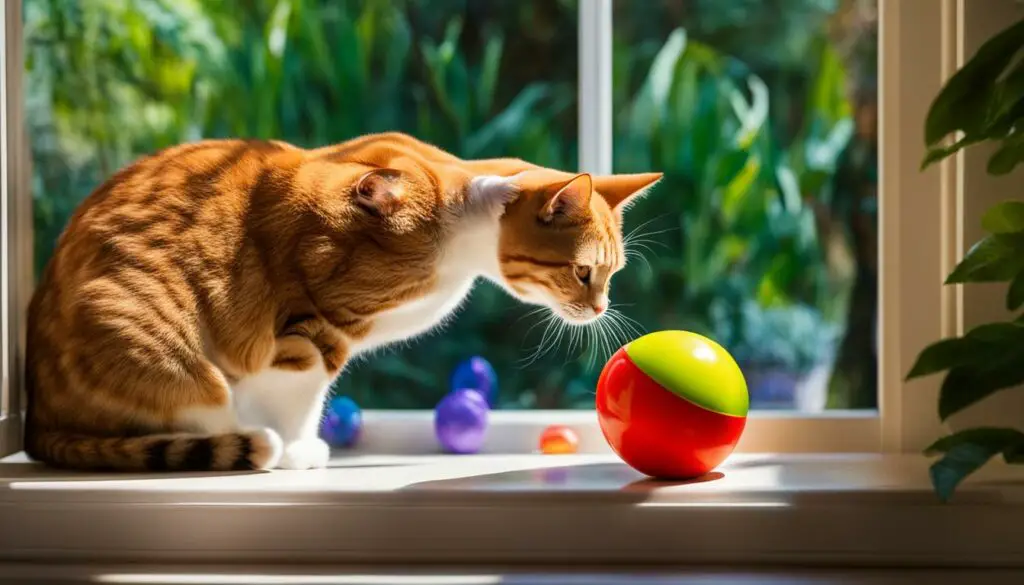
“Cats are sensitive creatures. Addressing their emotional needs can significantly impact their behavior, including excessive hunger.” – Veterinary Behaviorist
Importance of Veterinary Evaluation for Constant Hunger
When it comes to a cat’s constant hunger and meowing, seeking a veterinary evaluation is of utmost importance. While occasional begging for food is normal, persistent excessive hunger could be a sign of an underlying health concern. If your cat consistently displays excessive hunger, it is essential to consult a veterinarian to ensure their well-being.
Vomiting, weight loss, changes in behavior, and other accompanying symptoms should also prompt an immediate veterinary evaluation. These signs may indicate more serious issues that require prompt attention. By seeking professional advice, you can rule out any underlying health concerns and ensure appropriate treatment if necessary.
Remember, hungry and meowing cats could be suffering from various medical conditions such as hyperthyroidism, diabetes, or malabsorptive diseases. A veterinarian can conduct thorough examinations, perform blood tests, and other diagnostic procedures to identify and treat these conditions effectively.
By working closely with a veterinarian, you can determine the best course of action to manage your cat’s constant hunger and meowing, promoting their overall well-being and quality of life.
Table: Common Medical Conditions Causing Constant Hunger in Cats
| Medical Condition | Symptoms | Treatment |
|---|---|---|
| Hyperthyroidism | Excessive appetite, weight loss, restlessness | Medication, surgery, or radioactive iodine therapy |
| Diabetes | Increased hunger, weight loss, excessive thirst | Insulin therapy, dietary changes |
| Malabsorptive Diseases | Weight loss, increased appetite, diarrhea | Specialized diets, medication |
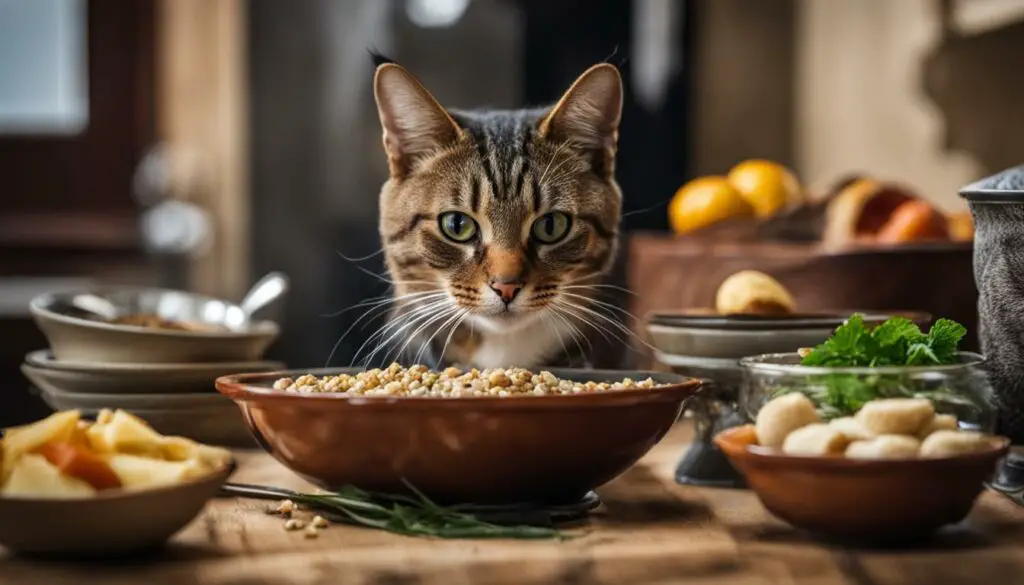
“Consulting a veterinarian is crucial in addressing the constant hunger and meowing in your cat. They will be able to conduct the necessary examinations and provide appropriate treatment if needed.” – Dr. Emily Sullivan, DVM
Treatment and Management of Excessive Hunger
If your cat is constantly meowing and always hungry, it is important to understand the underlying cause and implement appropriate treatment and management strategies. The specific approach will depend on the reason behind your cat’s excessive hunger and meowing. Working closely with a veterinarian will ensure a comprehensive and tailored plan for your cat’s needs.
One common strategy to stop a cat from meowing and manage their hunger is through dietary changes. Your veterinarian may recommend a specialized diet that meets your cat’s nutritional needs while addressing any underlying health conditions. Adjusting the feeding schedule and portion sizes can also help regulate your cat’s appetite and prevent overeating.
In some cases, medication may be necessary to address medical conditions contributing to your cat’s constant hunger. For example, if your cat is diagnosed with hyperthyroidism, medication or radioactive iodine therapy can help manage their insatiable appetite and restore balance to their thyroid hormone levels.
Environmental enrichment and mental stimulation play a crucial role in reducing boredom-related hunger in cats. Interactive toys, puzzle feeders, and playtime can keep your cat engaged and mentally stimulated, preventing them from seeking food as a source of entertainment. A consistent routine and plenty of physical activity can also help alleviate excessive meowing and hunger.
“Proper treatment and management of excessive hunger in cats require a comprehensive approach, addressing the underlying cause and implementing dietary, medication, and behavioral changes.”
It is important to note that the treatment and management of excessive hunger in cats require a comprehensive approach, addressing the underlying cause and implementing dietary, medication, and behavioral changes. Regular follow-ups with your veterinarian are essential to monitor your cat’s progress and make any necessary adjustments to their treatment plan.
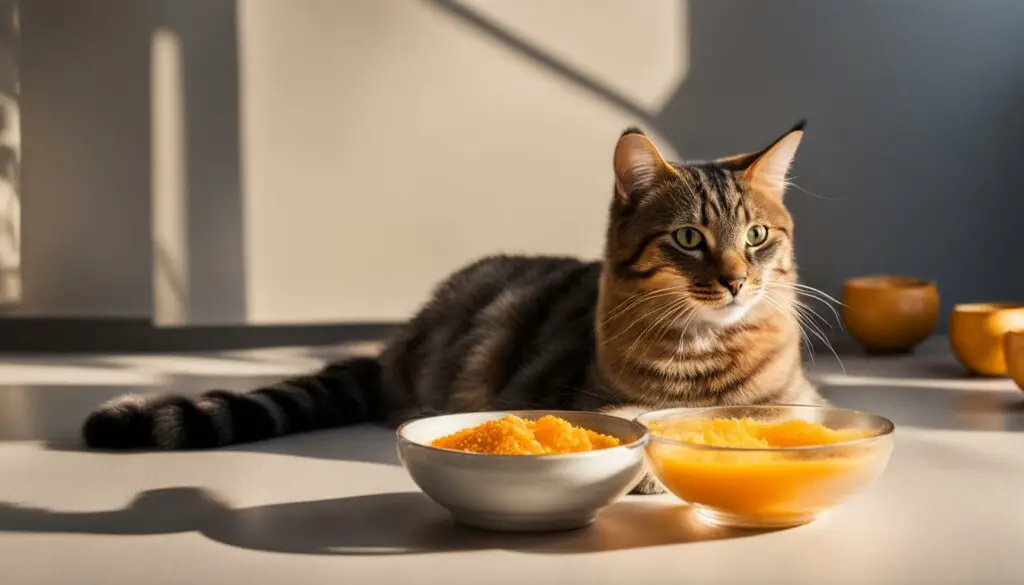
| Treatment Options | Description |
|---|---|
| Dietary Changes | Switching to a specialized diet or adjusting feeding schedule and portion sizes to meet nutritional needs and regulate appetite. |
| Medication | Prescription medications to manage underlying medical conditions contributing to excessive hunger. |
| Environmental Enrichment | Providing interactive toys, puzzle feeders, and plenty of mental stimulation to alleviate boredom-related hunger. |
| Behavioral Changes | Implementing a consistent routine, regular playtime, and physical activity to reduce excessive meowing and hunger. |
Conclusion
As a cat owner, I understand the frustration of having a cat that is always hungry. In this article, I have explored the various reasons behind constant hunger in cats and provided insights into managing this behavior.
It is important to remember that excessive hunger in cats can be a sign of an underlying medical issue. Consulting with a veterinarian and conducting necessary tests can help identify and address any health concerns that may be causing your cat’s constant hunger.
In addition to medical factors, there are also behavioral and nutritional aspects to consider. Providing mental stimulation, ensuring a well-balanced diet, and addressing boredom can all play a role in managing your cat’s hunger. Working closely with a veterinarian to develop a tailored treatment plan is key in helping your cat lead a healthy and satisfying life.
Remember, my cat is always hungry and meowing is not just a simple behavior but a signal that should not be ignored. By understanding the reasons behind your cat’s constant hunger and working with a veterinarian, you can ensure your furry friend’s well-being and happiness.
FAQ
Why is my cat always hungry and meowing?
Cats may act hungry all the time, begging or whining for food between feedings, which could indicate a medical issue. Recognizing hunger cues in cats and knowing when to consult a veterinarian is essential.
How can I stop my cat from constantly meowing for food?
Understanding hunger-related behaviors and addressing the underlying causes can help. Environmental enrichment, interactive toys, and providing mental stimulation can alleviate boredom and reduce excessive meowing for food.
What should I feed my cat to prevent excessive hunger?
Feeding a well-balanced, feline-formulated diet based on the cat’s age, activity level, and nutritional needs is crucial. Consulting with a veterinarian to determine the appropriate diet and caloric intake can help address these issues.
What medical conditions can cause constant hunger in cats?
Cats that are constantly hungry may have underlying conditions such as hyperthyroidism, diabetes, malabsorptive diseases, or side effects of medications. Veterinary examination, blood tests, and other diagnostic procedures are necessary for proper diagnosis and treatment.
Can intestinal parasites cause increased hunger in cats?
Yes, intestinal parasites like roundworms and tapeworms can steal nutrition from cats, resulting in increased hunger despite frequent feedings. Fecal testing and deworming medications can help eliminate these parasites and reduce excessive hunger.
How does hyperthyroidism affect a cat’s appetite?
Hyperthyroidism, characterized by excessive production of thyroid hormone, can lead to an insatiable appetite in cats. Diagnosis through blood tests and treatment with medication or radioactive iodine therapy can help normalize their appetite.
Can diabetes cause increased hunger in cats?
Yes, cats with diabetes may experience increased hunger due to imbalanced blood sugar levels. Blood glucose testing, urine analysis, insulin therapy, and dietary changes are essential for managing diabetes and controlling their appetite.
What are malabsorptive diseases and how do they affect a cat’s hunger?
Malabsorptive diseases like inflammatory bowel disease and exocrine pancreatic insufficiency can disrupt nutrient absorption, leading to weight loss, muscle wasting, and increased appetite. Diagnosis through bloodwork, urine testing, and imaging techniques can guide appropriate treatment options.
Can psychological factors contribute to a cat’s excessive hunger?
Yes, psychological factors such as boredom, anxiety, and depression can drive cats to seek food as a source of comfort or entertainment. Addressing these underlying issues through environmental enrichment, play therapy, and a consistent routine can help alleviate excessive hunger.
When should I consult a veterinarian for my cat’s constant hunger?
If a cat consistently displays excessive hunger, it is essential to consult a veterinarian. Vomiting, weight loss, changes in behavior, and other accompanying symptoms should prompt an immediate veterinary evaluation to rule out underlying health concerns.
What are the treatment options for excessive hunger in cats?
Treatment options depend on the underlying cause and may include dietary changes, medication, deworming, surgery, or specialized therapies. Working closely with a veterinarian is essential to develop an appropriate treatment plan.
How can I help manage my cat’s hunger and promote a healthy lifestyle?
Understanding the reasons behind a cat’s constant hunger and meowing is crucial. By addressing underlying medical conditions, providing a balanced diet, and considering psychological factors, pet owners can help manage their cat’s hunger. Regular veterinary care and open communication with a veterinarian are also essential.
Source Links
- https://www.thesprucepets.com/cat-always-hungry-554001
- https://www.petmd.com/cat/symptoms/why-my-cat-always-hungry
- https://wagwalking.com/cat/symptom/why-is-my-cat-always-hungry

